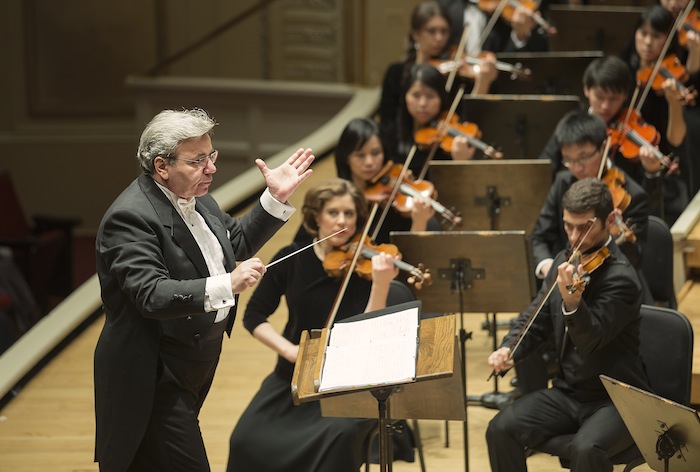East doesn’t quite meet West in Shen Yun Orchestra concert
The Shen Yun Symphony Orchestra is a sleekly packaged corporate enterprise, a sort of Chinese pops orchestra based in New York. Promising “5,000 years of music in one captivating concert,” the group drew a sizable and excitable audience to the Arsht Center on Thursday night.
The ensemble and associated stage and dance spectacles that have been touring for several seasons are the creation of composer-arranger-producer “D.F.” While the orchestra’s attempts to fuse traditional Chinese music with the Western classical tradition, the scores of D.F. and his colleagues pursue that synthesis in a once-over-easy manner, lacking the ambition and willingness to fail of Yo Yo Ma’s best Silk Road Ensemble commissions.
Jing Xian’s opening Following the Creator to Renew All Things set the tone for the evening, mixing standard symphonic instrumentation with such indigenous instruments as the pipa and erhu. Xian’s lush string writing and martial strains sounded like background music for a travelogue yet the well-drilled orchestra had the sheen and polish of a strong studio band.
Xian’s Snow Capped Celebration was less successful, recalling the corny melodies of such previous fusion attempts as Yellow River (Piano) Concerto and Butterfly Lovers’ Concerto for violin. There was more than a touch of Miklós Rózsa-Ben Hur cinematic glitz in Xian’s Capturing Arrows with Boats of Straw, a Hollywood-style tone poem.
Except for the brassy Power of Compassion, the concert’s closing work, D.F.’s compositions were pastoral in tone. Sleeves of Grace melded erhu, harp and strings to lovely effect. Courtyard Elegance and Scholarly Aspirations were brief lyrical essays. Gao Yuan’s In the Village of Nimong highlighted the plucked pipa with a catchy melody.
The group’s three erhu players (Xiaochun Qi, Lu Sun, Mei Xuan) took center stage for D.F.’s evocative All for Today. The bowed instrument’s unique tone shone to fine effect and in a fast-paced finale, the players’ dexterity and rhythmic acuity proved impressive.
Violinist Fiona Zheng offered a rubato-heavy traversal of Sarasate’s Zigeunerweisen. WHile her playing was accurate and well schooled, Zheng’s playing was too straitlaced, lacking the fire and brio that can make this kind of showpiece exciting.
Three Chinese opera singers in traditional costume brought some needed authenticity and impressive vocalism to the program. Min Jiang’s high, slightly acidic soprano rang the hall in D.F.’s Puccini-like For You I Sing. Although Haoian Geng was credited as a soprano, her dusky, low tones would make her a natural for Strauss mezzo roles in the Western operatic canon. Her big, lustrous sound brought cheers in Song for the Ancestors. Tian Ge has sung Verdi and Puccini roles. His attractive lyric tenor and the ring of his high register were on display in his own composition, Fulfilling My Dream, the evening’s best melody.
Bulgarian conductor Milen Nachev presided over the orchestral pieces with a martinet’s icy efficiency. Tchaikovsky’s Marche Solonnelle sounded downright bandmasterish under his rigid beat. While this score is a potboiler replete with reprises of God Save the Czar, it can still stir excitement under the right baton. William Kuo directed the vocal selections and ehru piece with sensitivity and fine collaborative skill.
Posted in Performances
Leave a Comment
Fri Oct 16, 2015
at 12:58 pm
No Comments





